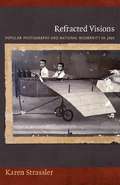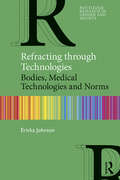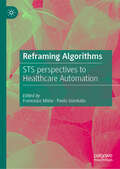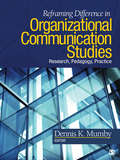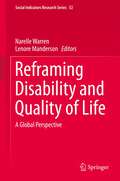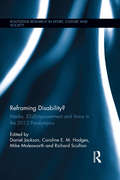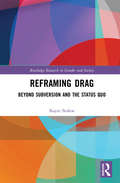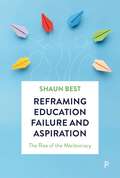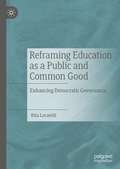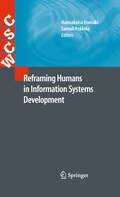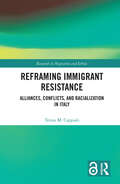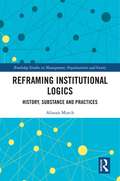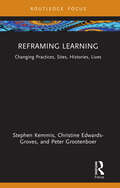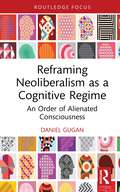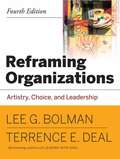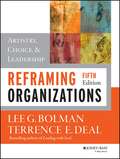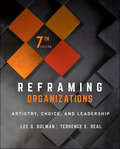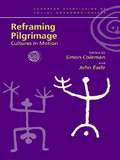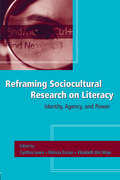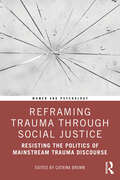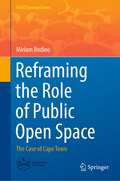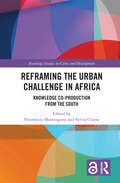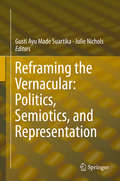- Table View
- List View
Refracted Visions: Popular Photography and National Modernity in Java
by Karen StrasslerA young couple poses before a painted backdrop depicting a modern building set in a volcanic landscape; a college student grabs his camera as he heads to a political demonstration; a man poses stiffly for his identity photograph; amateur photographers look for picturesque images in a rural village; an old woman leafs through a family album. In Refracted Visions, Karen Strassler argues that popular photographic practices such as these have played a crucial role in the making of modern national subjects in postcolonial Java. Contending that photographic genres cultivate distinctive ways of seeing and positioning oneself and others within the affective, ideological, and temporal location of Indonesia, she examines genres ranging from state identification photos to pictures documenting family rituals. Oriented to projects of selfhood, memory, and social affiliation, popular photographs recast national iconographies in an intimate register. They convey the longings of Indonesian national modernity: nostalgia for rural idylls and "tradition," desires for the trappings of modernity and affluence, dreams of historical agency, and hopes for political authenticity. Yet photography also brings people into contact with ideas and images that transcend and at times undermine a strictly national frame. Photography's primary practitioners in the postcolonial era have been Chinese Indonesians. Acting as cultural brokers who translate global and colonial imageries into national idioms, these members of a transnational minority have helped shape the visual contours of Indonesian belonging even as their own place within the nation remains tenuous. Refracted Visions illuminates the ways that everyday photographic practices generate visual habits that in turn give rise to political subjects and communities.
Refracting through Technologies: Bodies, Medical Technologies and Norms (Routledge Research in Gender and Society)
by Ericka JohnsonThis book explores the ‘material-discursive entanglement’ of how we both make the world with our words and how the materiality of the world forces us to put words on it. Beginning with the conundrum of how the things that make up our world are both shaped by and shape the ways in which we talk about, engage with and think about them, the author accepts the entanglement and then works backwards, using the metaphor of refraction to help articulate the structures, values and norms that discursively shape our world and our selves in it. Through a series of empirical examples taken from work on medical technologies and the body, Refracting through Technologies shows how researchers and designers can use material things – technologies – to refract discourses and articulate the concerns and voices producing them. Refraction as a metaphor is thus revealed to be an important concept, enabling scholars to apply analytical work to political concerns about the technological world. As such, it will appeal to scholars of sociology, science and technology studies, philosophy and design with interests in technoscience, feminist thought and social theory.
Reframing Algorithms: STS perspectives to Healthcare Automation
by Francesco Miele Paolo GiardulloThis book provides a fully-fledged exploration of science and technology studies (STS) perspective applied to algorithms developed to support care processes. By concentrating on algorithmic technologies for supporting processes of social and health care, the book intersects topics connected to technoscientific innovation and specifically digital transformation for health care. By offering different attempts of deconstructing algorithmic technologies, the book provides a landmark reference for those interested in undertaking research focused on areas connected to algorithmic decision-making for health care. The book will be an invaluable reference for scholars interested in the STS debate and related fields (e.g.,human–computer interaction, computer supported cooperative work, participatory design, and sociology of health and medicine). This book responds to a growing interest in the application of algorithms’ to local and national care systems. The book balances theoretical and empirical analysis bringing together experienced and early-career scholars. This book will be of interest to researchers in STS as well as healthcare professionals and managers as some of the topics covered help to critically reconsider some facets of planning through algorithmic technologies supporting the practice of healthcare and decision-making.
Reframing Difference in Organizational Communication Studies: Research, Pedagogy, and Practice
by Dennis K. MumbyThe first text to systematically examine difference as a defining feature of organizational life Bringing together prominent scholars in the field of organizational communication to examine the relationship between difference and organizing, this book explores the concept in a comprehensive and systematic way. Part I explores numerous ways in which difference can be critically examined as a communicative phenomenon; Part II addresses how best to teach difference, including pragmatic recommendations for explaining the topic and making it relevant to students′ lives; and Part III broadly examines difference as a central construct in applied organizational communication research. Ultimately, the book serves to carve out a new agenda for studies of difference and organization, and it challenges instructors and students alike to think about and explore difference in a more complex and productive manner.
Reframing Disability and Quality of Life: A Global Perspective
by Lenore Manderson Narelle WarrenThis volume brings together two parallel fields of interest. One is the understanding among psychologists and other social scientists of the limits to psychometric measurement, and the challenges in generating information about quality of life and wellbeing that enable comparison across time and place, at both individual and population levels. The second is the interest among anthropologists and others in the lived experience of chronic illness and disability, including the unpredictable fluctuations in perceived health and capability. Chronic conditions and physical impairments are assumed to impact negatively on people's quality of life, affecting them psychologically, socially and economically. While some of these conditions have declined in prevalence, as a result of prenatal diagnosis, early successful interventions, and changes in medical technology and surgery, many of these conditions are on the increase as a consequence of improved life-saving medication and technology, and greater longevity. 'Quality of life' is often used as an indicator for successful and high quality health services, and good access to medical attention and surgery - for hip replacements or laser surgery to improve vision, for instance. But it is also used as an argument against interventions, when such interventions are seen to prolong life for its own sake. Yet we also know that people vary their idea of quality as a result of the context of fluctuations in their own health status, the presence or absence of pain or discomfort, and as a result of variations in social and economic contextual factors. In exploring these questions, this volume contributes to emerging debates related to individual health outcomes, but also to the social and other individual determinants that influence everyday life. Understanding these broader contextual factors will contribute to our knowledge of the kinds of services, support systems, and infrastructure that provide people with good 'quality of life' and a sense of wellbeing, regardless of their physical health, capability and functioning. The volume includes scholars from all continents who have been encouraged to think critically, and to engage with the descriptive, methodological, social, policy and clinical implications of their work.
Reframing Disability?: Media, (Dis)Empowerment, and Voice in the 2012 Paralympics (Routledge Research in Sport, Culture and Society #41)
by Daniel Jackson Caroline E.M. Hodges Mike Molesworth Richard ScullionThe London 2012 Paralympic Games - the biggest, most accessible and best-attended games in the Paralympics' 64-year history - came with an explicit aim to "transform the perception of disabled people in society," and use sport to contribute to "a better world for all people with a disability." This social agenda offered the potential to re-frame disability; to symbolically challenge "ableist" ideology and to offer a reinvention of the (dis)abled body and a redefinition of the possible. This edited collection investigates what has and is happening in relation to these ambitions. The book is structured around three key questions: 1. What were the predominant mediated narratives surrounding the Paralympics, and what are the associated meanings attached to them? 2. How were the Paralympics experienced by media audiences (both disabled and non-disabled)? 3. To what extent did the 2012 Paralympics inspire social change? Each section of this book is interspersed with authentic "voices" from outside academia: broadcasters, athletes and disabled schoolchildren.
Reframing Drag: Beyond Subversion and the Status Quo (Routledge Research in Gender and Society)
by Kayte StokoeReframing Drag provides a critical survey of French and Anglo-American queer and feminist theorizations of drag performance, placing these approaches in a dialogue with contemporary drag practice and the representation of drag in three literary texts. Challenging pervasive assumptions circulating in existing queer and feminist analyses of drag performance, the author identifi es and questions three recurring ideas which have shaped the landscape of drag research: the argument that drag performances either uphold or subvert oppressive gender norms, the assumption that drag involves performing as the ‘opposite sex’, and the belief that drag can shed light on gender performativity. Informed by a range of gender and queer theory, this work contends that an intersectional, transfeminist approach to drag performance can provide richer, more nuanced understandings of drag and, unlike the ‘opposite sex’ narrative, acknowledges the gender diversity at work in current drag scenes.
Reframing Education Failure and Aspiration: The Rise of the Meritocracy
by Shaun BestEducation is considered central to social mobility and, following a drive to raise learners’ aspirations, an ‘aspiration industry’ has emerged. However, the desire to leave school early should not be regarded as evidence of students lacking ambition. This book traces the emergence of the aspiration industry and argues that to have ambitions that do not require qualifications is different, but not wrong. Reviewing the performance of six schools in England, their Ofsted reports and responses, it evaluates underpinning assumptions of what makes an effective school. This book critically examines neo-liberal education policy developments, including the 1988 Education Reform Act, and the political discourse around changing explanations of education ‘failure’ with the rise in the marketisation of education.
Reframing Education as a Public and Common Good: Enhancing Democratic Governance
by Rita LocatelliThis book examines the normative principles that guide the governance of education, in particular the notion of education as a public good. Determining whether this concept is still valid is a topic of growing importance, especially considering the phenomena of increasing privatisation and marketisation in the sector. The author posits that the prioritisation of economic aspects of education may lead to the weakening of the role of the State in ensuring equality of opportunity and social justice, and thus to a significant risk of considering education as merely a private, marketable good. The volume argues that considering education as a common good can lead to the strengthening of democratic and participatory approaches to educational governance, based on the recognition of education as a shared endeavour and responsibility. It will be of interest and value to students and scholars of education as a public good, social justice, and the wider neoliberalisation of the education sector.
Reframing Humans in Information Systems Development
by Hannakaisa Isomäki Samuli PekkolaModern society has been transformed by the digital convergence towards a future where technologies embed themselves into the fabric of everyday life. This ongoing merging of social and technological infrastructures provides and necessitates new possibilities to renovate past notions, models and methods of information systems development that accommodates humans as actors within the infrastructure. This shift introduces new possibilities for information systems designers to fulfil more and more everyday functions, and to enhance their value and worth to the user. Reframing Humans in Information Systems Development aims to reframe the phenomenon of human-centered development of information systems by connecting scientific constructs produced within the field of information systems which has recently provided a plethora of multidisciplinary user views, without explicitly defining clear constructs that serve the IS field in particular. IS researchers, practitioners and students would benefit from Reframing Humans in Information Systems Development as the book provides a comprehensive view to various human-centered development methods and approaches. The representatives of the fields of Human-Computer Interaction and Computer Supported Collaborative Work will also find this book an excellent resource. A theoretical handbook and collection of practical experiences, are included along with critical discussions of the utilization methods in ISD and their implications with some interconnecting commentary viewpoints.
Reframing Immigrant Resistance: Alliances, Conflicts, and Racialization in Italy (Research in Migration and Ethnic Relations Series)
by Teresa CappialiThis book focuses on the political participation and grassroots mobilization of immigrants and racialized communities in the European context. Based on extensive data collected in Italy, it explores the role that alliances among pro-immigrant groups play in shaping political participation, asking why and how immigrant activists mobilize in hostile environments, why and how they create alliances with some white allies rather than others, and what might explain variations in forms of political participation and grassroots mobilization at the local level. Using social movement, critical race, and post-colonial theories, the author examines the ways in which both institutional and non-institutional actors, including immigrant activists, become involved and compete in the local arena over immigration and integration issues, and assesses the mechanisms by which both conventional and non-conventional forms of participation are made possible, or obstructed. By placing immigrant activists at the center of the analysis, the book offers a valuable and novel insider perspective on political activism and the claims-making of marginalized groups. It also demonstrates how pro-immigrant groups can play a role in racializing immigrant activists. A study of the effects on participation in social mobilization of coalitions, conflicts, and racialization processes among pro-immigrant groups and immigrant activists, this volume will appeal to scholars of sociology, political science, and political sociology with interests in migration, ethnic and racial relations, social movements, and local governance.
Reframing Institutional Logics: Substance, Practice and History (Routledge Studies in Management, Organizations and Society)
by Alistair MutchHow are we to characterise the context in which organisations operate? The notion that organisational activity is shaped by institutional logics has been influential but it presents a number of problems. The criteria by which institutions are identified, the conflation of institutions with organisations, the enduring nature of those institutions and an exaggerated focus on change are all concerns that existing perspectives do not tackle adequately. This book uses the resources of historical work to suggest new ways of looking at institutional logics. It builds on the work of Roger Friedland who has conceived of institutional logics being animated by adherence to a core substance that is immanent in practices. Development of this idea in the context of organisation theory is supported by ideas drawn from the work of the social theorist Margaret Archer and the broader resources of the philosophical tradition of critical realism. Institutions are seen to emerge over time from the embodied relations of humans to each other and to the natural world on which they depend for material existence. Once emergent, institutions develop their own logics and endure to form the context in which agents are involuntarily placed and that conditions their activity. The approach adopted offers resources to ‘bring society back in’ to the study of organisations. The book will appeal to graduate students who are engaging with institutional theory in their research. It will also be of interest to scholars of institutional theory, of the history of organisations and those seeking to apply ideas from critical realism to their research.
Reframing Learning: Changing Practices, Sites, Histories, Lives (Routledge Research in the Sociology of Education)
by Stephen Kemmis Christine Edwards-Groves Peter GrootenboerDisrupting the individualism of much conventional psychological research into learning, this book presents a situated, practice-based understanding of learning, based on the theories of situated learning and practice architectures, conceptualising learning as ontological transformation. While accepting that learning is consequential for learners, this book explores how learning matters for and in the world. The authors present a view of learning not just in the context of the lives of learners and those around them, but as part of the dynamic and organic site-ontological processes of world-historical and ecological change. While learners may be stars in their own lives and learning, they are also living, agentic beings who are part of Earth’s community of life and who respond to the changing world in ways that are consequential beyond their own lives. The book explores the place of learning from the point of view of the world as much as from the point of view of the learner. Distinctively, the book conceptualises learning as a social accomplishment and as a process that changes the worlds beyond individual learners.A groundbreaking contribution from the leading scholars in the field, this book will be of great interest to scholars, researchers, and post-graduate students of education, social science, and philosophy, and the specific fields of professional practice, practice theory, learning sciences, and sociology.
Reframing Neoliberalism as a Cognitive Regime: An Order of Alienated Consciousness
by Daniel GuganThis volume provides a new exploration of the complex phenomenon of neoliberalism from a unique perspective, casting it as our contemporary “collective consciousness” and arguing for its interpretation not as a political ideology, but as a multifaceted cognitive system.It maps out the formation processes and structural buildup of these systems by elaborating first on a certain model of individual cognition, then scaling it up to the societal level. This collective cognitive model then provides the foundation for in‑depth analysis of “cognitive regimes,” which are understood as the different examples of culturally defined and externally structured collective consciousnesses. Several attributes and their different dynamics are explored and organized into a general framework, such that a new and comprehensive understanding of the subject can be extracted. It offers valuable analysis of what this “cognitivist” approach to neoliberalism can provide for re‑imagining our future in a world struggling with ecologic, economic, demographic, and climatic degradation, and what lessons can be learned for an era overshadowed by a potential climatic collapse.Academics interested in the expansion of the “critique of neoliberalism” discourse to the socio‑cognitive field, looking for some novelties in the well‑established academic literature around this subject, would greatly benefit from this text. With its clear and concise format, it is also of interest to motivated readers from outside academia.
Reframing Organizations: Artistry, Choice, and Leadership
by Lee G. Bolman Terrence E. DealBolman (leadership, University of Missouri) and Deal (education, University of Southern California) describe four frames through which to view all types of organizations. They show how the structural, human resource, political, and symbolic frames can be employed to find new opportunities in organizations. This third edition highlights current developments in leadership and presents new case histories from organizations such as eBay, Enron, and the US Marine Corps.
Reframing Organizations: Artistry, Choice, and Leadership
by Lee G. Bolman Terrance E. DealThoroughly updated, this fifth edition of the classic book outlines its four-frame model that examines organizations as factories, families, jungles, and theaters or temples: The Structural Frame: organize and structure groups and teams; The Human Resource Frame: tailor organizations to satisfy human needs, improve HRM, and build positive personal and group dynamics; The Political Frame: cope with power and conflict, build coalitions, hone political skills, and deal with politics; and The Symbolic Frame: shape a culture that gives purpose and meaning to work, stage organizational drama, and build team spirit.
Reframing Organizations: Artistry, Choice, and Leadership
by Lee G. Bolman Terrence E. DealAN ELEGANT FRAMEWORK FOR MORE EFFECTIVE LEADERSHIP Bolman and Deal’s four-frame model has been transforming business leadership for over 40 years. Using a multidisciplinary approach to management, this deceptively simple model offers a powerful set of tools for navigating complexity and turbulence; as the political and economic climate continues to evolve, this model has never been more relevant than today. The Structural Frame explores the convergence of organizational structure and function, and shows why social architecture must take environment into account. Case studies illustrate successful alignment in diverse organizations, and guidelines provide strategic insight for avoiding common pathologies and achieving the right fit. The Human Resource Frame dissects the complex dynamics at the intersection of people and organizations and charts the leadership and human resource practices that build motivation and high performance. The Political Frame shows how competition, conflict, and the struggle for power and resources can be either a tool for growth or a toxic landmine for an individual or organization. Case studies show how both constructive and destructive practices influence social, political, and economic trends both within and beyond organizational boundaries. The Symbolic Frame defines organizational culture, and delves into the emotional and existential underbelly of social life. It underscores the power of symbolic forms such as heroes, myths, and rituals in providing the glue that bonds social collectives together. The Seventh Edition has been updated with new information on cross-sector collaboration, generational differences, virtual environments, globalization, cross-cultural communication, and more, with an expanded Instructor’s Guide that includes summaries, mini-assessments, videos, and extra resources.
Reframing Pilgrimage: Cultures in Motion
by Simon Coleman John EadeReframing Pilgrimage argues that sacred travel is just one of the twenty-first century's many forms of cultural mobility. The contributors consider the meanings of pilgrimage in Christian, Mormon, Hindu, Islamic and Sufi traditions, as well as in secular contexts, and they create a new theory of pilgrimage as a form of voluntary displacement. This voluntary displacement helps to constitute cultural meaning in a world constantly 'en route'. Pilgrimage, which works both on global economic and individual levels, is recognised as a highly creative and politically charged force intimately bound up in economic and cultural systems
Reframing Sociocultural Research on Literacy: Identity, Agency, and Power
by Cynthia Lewis Elizabeth Birr Moje Patricia EncisoThis landmark volume articulates and develops the argument that new directions in sociocultural theory are needed in order to address important issues of identity, agency, and power that are central to understanding literacy research and literacy learning as social and cultural practices. With an overarching focus on the research process as it relates to sociocultural research, the book is organized around two themes: conceptual frameworks and knowledge sources. *Part I, “Rethinking Conceptual Frameworks,” offers new theoretical lenses for reconsidering key concepts traditionally associated with sociocultural theory, such as activity, history, community, and the ways they are conceptualized and under-conceptualized within sociocultural theory.*Part II, “Rethinking Knowledge and Representation,” considers the tensions and possibilities related to how research knowledge is produced, represented, and disseminated or shared—challenging the locus of authority in research relationships, asking who is authorized to be a legitimate knowledge source, for what purposes, and for which audiences or stakeholders. Employing the lens of “critical sociocultural research,” this book focuses on the central role of language and identity in learning and literacy practices. It is intended for scholars, researchers, and graduate students in literacy education, social and cultural psychology, social foundations of education, educational anthropology, curriculum theory, and qualitative research in education.
Reframing Trauma Through Social Justice: Resisting the Politics of Mainstream Trauma Discourse (Women and Psychology)
by Catrina BrownThis cross-disciplinary volume examines and reframes trauma as a social and political issue in the context of wider society, critiquing the widely accepted pathologizing of trauma and violence in current discourse.Rooted in critical social theory, this insightful text reinvokes the critiques and analysis of the women’s movement and the "personal is political" framing of trauma to unpack the mainstreaming of trauma discourse which has emerged today. Accomplished contributors address the social construction of femininity and masculinity in relation to trauma and violence, and advocate for a broader framing of trauma away from the constrained focus on pathologizing and diagnosing trauma, individual psychologizing and therapy. Instead, the book offers a fresh and compelling look at how discursive resistance, alternative feminist and narrative approaches to emotional distress and the mental health effects of violence can be developed alongside community-based, preventive, political and policy-based actions to create effective shifts in discourse, practice, policy and programming.This is fascinating reading for upper-level undergraduate and postgraduate students, researchers and academics in a broad range of fields of study, including psychology, social work, gender and women’s studies and sociology, as well as for professionals, including policy makers, clinical psychologists and social workers.
Reframing Visual Social Science
by Luc PauwelsThe burgeoning field of 'visual social science' is rooted in the idea that valid scientific insight into culture and society can be acquired by observing, analyzing and theorizing its visual manifestations: visible behavior of people and material products of culture. Reframing Visual Social Science provides a well-balanced, critical-constructive and systematic overview of existing and emerging modes of visual social and cultural research. The book includes integrated models and conceptual frameworks, analytical approaches to scrutinizing existing imagery and multimodal phenomena, a systematic presentation of more active ways and formats of visual scholarly production and communication, and a number of case studies which exemplify the broad fields of application. Finally, visual social research is situated within a wider perspective by addressing the issue of ethics; by presenting a generic approach to producing, selecting and using visual representations; and through discussing the specific challenges and opportunities of a 'more visual' social science.
Reframing the Feudal Revolution
by Charles WestThe profound changes that took place between 800 and 1100 in the transition from Carolingian to post-Carolingian Europe have long been the subject of vigorous historical controversy. Looking beyond the notion of a 'Feudal Revolution', this book reveals that a radical shift in the patterns of social organisation did occur in this period, but as a continuation of processes unleashed by Carolingian reform, rather than Carolingian political failure. Focusing on the Frankish lands between the rivers Marne and Moselle, Charles West explores the full range of available evidence, including letters, chronicles, estate documents, archaeological excavations and liturgical treatises, to track documentary and social change. He shows how Carolingian reforms worked to formalise interaction across the entire social spectrum, and that the new political and social formations apparent from the later eleventh century should be seen as long-term consequence of this process.
Reframing the Role of Public Open Space: The Case of Cape Town (PoliTO Springer Series)
by Miriam BodinoThis book explores the growing spatial inequality in contemporary cities, and the opportunity of reframing the role of public open space as a tool of inclusion in a context of an increasing economic gap between the urban poor and rich. The first part outlines the geographical and theoretical frames of reference, which are then tested in the analysis of a case study: Cape Town. This city in South Africa was selected since its spatial aspects of separation are particularly evident due to the legacy of both apartheid and modernism. The examination of the policies of the City of Cape Town confirms the rising attention to public space since the 1990s. This slow progress of desegregation is tested through a critical study of one of the most disadvantaged areas of the city, Khayelitsha. The book explores the relevance and impact of an urban-design project, and reframes the role of public open space not only as a tool for restructuring the apartheid city, but also for reinterpreting other fragmented contemporary cities.
Reframing the Urban Challenge in Africa: Knowledge Co-production from the South (Routledge Studies in Cities and Development)
by Ntombini Marrengane Sylvia CroeseThis book explores the changing dynamics and challenges behind the rapid expanse of Africa’s urban population. Africa’s urban age is underway. With the world’s fastest growing urban population, the continent is rapidly transforming from one that is largely rural, to one that is largely urban. Often facing limited budgets, those tasked with managing African cities require empirical evidence on the nature of demands for infrastructure, escalating environmental hazards, and ever-expanding informal settlements. Drawing on the work of the African Urban Research Initiative, this book brings together contributions from local researchers investigating key themes and challenges within their own contexts. An important example of urban knowledge coproduction, the book demonstrates the regional diversity that can be seen as the main feature of African urbanism, with even well-accepted concepts such as informality manifesting in markedly different ways from place to place. Providing an important nuanced perspective on the heterogeneity of African cities and the challenges they face, this book will be an important resource for researchers across development studies, African studies, and urban studies.
Reframing the Vernacular: Politics, Semiotics, and Representation
by Gusti Ayu Made Suartika Julie NicholsThe aim of this book is to reflect on ''vernacularity'' and culture. It concentrates on two major domains: first it attempts to reframe our understanding of vernacularity by addressing the subject in the context of globalisation, cross-disciplinarity, and development, and second, it discusses the phenomenon of how vernacularity has been treated, used, employed, manipulated, practiced, maintained, learned, reconstructed, preserved and conserved, at the level of individual and community experience. Scholars from a wide variety of knowledge fields have participated in enriching and engaging discussions, as to how both domains can be addressed. To expedite these aims, this book adopts the theme "Reframing the Vernacular: Politics, Semiotics, and Representation",organised around the following major sub-themes: • Transformation in the vernacular built environment • Vernacular architecture and representation • The meaning of home • Symbolic intervention and interpretation of vernacularity • The semiotics of place • The politics of ethnicity and settlement • Global tourism and its impacts on vernacular settlement • Vernacular built form and aesthetics • Technology and construction in vernacular built forms • Vernacular language - writing and oral traditions
